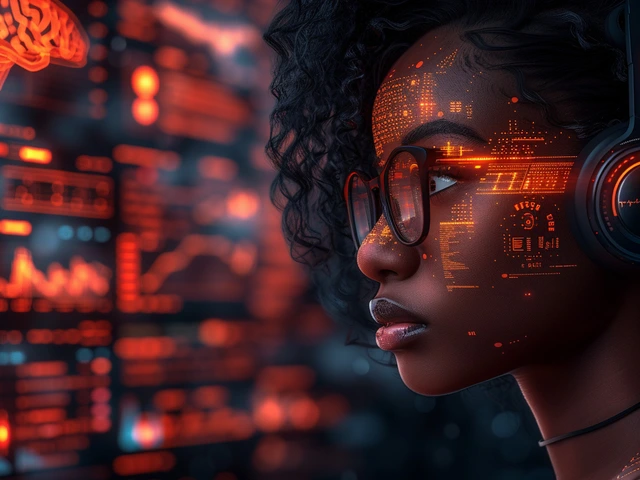Mastering AI: Your Guide to Success in the Digital Era

Mastering AI: Your Guide to Success in the Digital Era
In today’s digital world, understanding artificial intelligence (AI) is becoming as essential as knowing how to use a smartphone. AI isn’t just a buzzword; it’s a tool that’s reshaping industries and altering the way we live and work.
Think about your daily life. From personalized recommendations on your favorite streaming service to virtual assistants that help manage your schedule, AI is all around us. The potential of AI extends far beyond simple convenience; it’s driving innovation in healthcare, finance, education, and numerous other fields.
For anyone keen on thriving in this new era, learning AI isn’t just an option—it’s a necessity. This article will guide you through the basics of AI, why it's crucial, and how you can start learning and applying AI skills effectively.
- Understanding Artificial Intelligence
- Why AI Skills Are Essential Today
- Getting Started with AI Learning
- Practical Ways to Apply AI Skills
- How AI Is Changing Industries
- The Future of AI and Your Role in It
Understanding Artificial Intelligence
Artificial intelligence, often abbreviated as AI, is essentially the capability of a machine to simulate human intelligence. It involves programming computers to process information, recognize patterns, learn from data, and make decisions, all with minimal human intervention.
The concept of AI isn't new. It dates back to the 1950s when computer science pioneers like Alan Turing began pondering the possibilities of machines that could think. Today, AI encompasses a wide range of technologies, including machine learning (ML), natural language processing (NLP), and computer vision. Each of these areas helps machines perform tasks that typically require human intelligence.
One of the core methodologies used in AI is machine learning. This involves training algorithms with vast amounts of data, enabling them to improve over time. For instance, systems can be trained to recognize speech patterns or identify images, eventually becoming proficient enough to perform these tasks better than humans.
Another important branch of AI is natural language processing. NLP focuses on enabling computers to understand and respond to human language. This is what powers virtual assistants like Siri and Alexa, helping them comprehend your questions and provide useful answers.
AI guru Andrew Ng once said, "Artificial Intelligence is the new electricity." This underscores how AI technologies are becoming as fundamental as electricity was in the previous century, transforming industries and daily life.
Additionally, computer vision enables machines to interpret and react to visual inputs just as humans do. For instance, self-driving cars use computer vision to navigate roads, recognize obstacles, and ensure passenger safety.
According to a 2022 study by Gartner, companies that leverage AI can improve their operational efficiency by up to 40%. This statistic highlights how AI isn't just a futuristic concept but a present-day game-changer. The widespread adoption of AI technologies is making processes faster, more efficient, and often less costly.
Types of AI
Artificial intelligence is often categorized into two primary types: narrow AI and general AI. Narrow AI is designed for specific tasks, such as facial recognition or internet searches. It excels at the single task it is trained to do, and examples include recommendation algorithms used by Netflix or Amazon.
General AI, on the other hand, aims to replicate broader human cognitive abilities. It can perform any intellectual task that a human can, with the goal of becoming an all-encompassing intelligence. While narrow AI is prevalent in today’s world, general AI remains a theoretical concept and a subject of ongoing research.
Why Is AI Important?
Artificial intelligence is revolutionizing various industries. In healthcare, AI-driven diagnostics can analyze medical images faster and more accurately than human doctors. In finance, AI algorithms predict market trends and aid in making lucrative investment decisions. Even in agriculture, AI-powered drones and sensors are optimizing crop yields and reducing resource usage.
For individuals and businesses alike, understanding and implementing AI can lead to significant advantages. Embracing AI can open doors to new opportunities, streamline operations, and provide a competitive edge in an increasingly digital world.
Why AI Skills Are Essential Today
To start, let’s recognize the prevalence of artificial intelligence in our daily interactions. AI isn’t just in high-tech labs or grandiose tech hubs; it is in our pockets, on our desktops, and in our homes. It’s integrated into social media algorithms, intelligent home devices, voice assistants like Siri and Alexa, and even in our healthcare systems, helping to identify diseases faster and more accurately.
One reason learning AI is crucial today is the job market. According to LinkedIn’s 2023 Emerging Jobs Report, AI specialists are among the top roles in demand. Employers are looking for professionals who can develop, implement, and maintain AI systems. From data scientists to machine learning engineers, having AI skills makes you valuable in nearly any industry.
The educational landscape is changing as well. More universities are incorporating AI into their curricula, emphasizing the importance of staying current with next-generation technologies. Online platforms like Coursera and edX offer specialized courses dedicated to AI, making it accessible to anyone with an internet connection. Even elementary and secondary schools are integrating basic AI concepts into their programs, prepping youngsters for a future where AI is as common as the internet is today.
Moreover, businesses across various sectors are leveraging AI to improve efficiency and customer experience. In retail, predictive analytics powered by AI helps companies forecast inventory needs, reducing waste and ensuring products are available when customers need them. In finance, AI algorithms can detect fraudulent transactions in seconds, safeguarding assets better than any human could. These applications highlight why professionals not equipped with AI knowledge may find themselves at a disadvantage.
Let’s not overlook creativity. While AI might seem like a technical fortress, it’s also a playground for artists. Musicians, filmmakers, and visual artists are using AI to push creative boundaries. Imagine collaborating with an AI to generate new melodies or using machine learning to enhance visual effects in filmmaking. The possibilities for creative expansion with AI are endless.
The global impact of AI is another critical factor. Nations are formulating policies and investing in AI research and development. China aims to become the world leader in AI by 2030, and the European Union has developed guidelines to ensure AI advancements align with ethical standards. This political and social movement towards AI demonstrates its significance on a larger scale.
"The future belongs to those who understand artificial intelligence and know how to harness it." - Andrew Ng, co-founder of Coursera and an AI pioneer.
Ultimately, acquiring AI skills is not just about staying relevant in your career. It’s about becoming part of a worldwide transformation. Understanding AI allows you to be a proactive participant in shaping the future, rather than a passive consumer. It empowers you with the tools to innovate, create, and build solutions that can benefit society as a whole.

Getting Started with AI Learning
So, you're eager to dive into the world of artificial intelligence but don't know where to start? Don’t worry, it’s a common feeling, especially with a subject as vast as AI. The best approach involves breaking the learning process into digestible pieces. First, understand the basic concepts. AI isn’t just for programmers; it’s for anyone willing to commit time and effort to learn.
Begin by familiarizing yourself with the core concepts. Terms like machine learning, neural networks, and data science might seem intimidating at first, but once you break them down, they become more approachable. There are numerous online resources available that cater to different learning styles. If you prefer structured learning, websites like Coursera and Udacity offer courses designed by top universities.
Interactive platforms like Codecademy and Khan Academy are fantastic for hands-on learning. They allow you to practice coding and see the results of your work in real-time. Python is often the language of choice for AI because of its simplicity and versatility. Think about investing time in learning Python before jumping into more complex AI topics.
According to Andrew Ng, co-founder of Coursera and an AI pioneer, 'AI is the new electricity. Just as electricity transformed almost everything 100 years ago, today I have a hard time thinking of an industry that I don't think AI will transform.'
Books can also be an invaluable resource. Titles like “Artificial Intelligence: A Modern Approach” by Stuart Russell and Peter Norvig provide in-depth knowledge and are often referred to as the bibles of AI. For those who love reading ebooks or listening to audiobooks, platforms like Kindle and Audible have extensive libraries.
Now, let’s talk about practical steps. Start small. Create simple projects such as chatbots or recommendation systems using resources like the TensorFlow library. Such projects will not only boost your confidence but also solidify your understanding of the concepts. GitHub is an excellent platform to find open-source projects you can contribute to.
Networking with other learners and professionals is equally important. Joining forums like Reddit’s r/MachineLearning or attending meetups can provide support and motivation. Here, you’ll find people who are at various stages of their AI journey, ready to share experiences and advice. Don’t hesitate to ask questions and seek help. No one becomes an AI expert overnight.
Remember, consistency is key. Dedicate a set amount of time each week to study. Whether it’s reading, coding, or watching video tutorials, make it a habit. This way, learning will become a part of your routine, and over time, you’ll notice significant progress.
Practical Ways to Apply AI Skills
Delving into the world of artificial intelligence can seem daunting, but the practical applications of AI skills are incredibly rewarding. Whether you’re looking to advance your career or simply intrigued by technology, there are several avenues where AI proficiency can make a significant impact.
One prominent area is data analysis. AI can sift through vast amounts of data far quicker and more accurately than any human. Companies utilize AI algorithms to crunch numbers, discern patterns, and make informed decisions. For instance, in marketing, AI tools analyze consumer behavior, helping businesses craft personalized experiences that boost customer loyalty and sales.
Another vital application is automation. From automating repetitive tasks to managing complex workflows, AI can significantly streamline operations in various industries. In manufacturing, AI-powered robots handle tasks that are dangerous or monotonous, improving both safety and efficiency. These changes not only enhance productivity but also free up human workers to engage in more creative and strategic activities.
Healthcare is also experiencing a revolution through AI. AI systems aid in diagnosing diseases, predicting patient outcomes, and suggesting treatments. A notable example is the AI algorithm developed by Google Health, which can detect diabetic retinopathy with remarkable accuracy. AI’s ability to process and learn from medical data promises a future where precision medicine tailors treatments to individual patients.
AI skills are also sought after in the realm of cybersecurity. As cyber threats become more sophisticated, AI helps to identify and mitigate risks in real-time. Machine learning algorithms continuously analyze network traffic patterns, flagging any anomalies that could indicate a security breach. This proactive approach is more effective than traditional methods, which often react to threats after the damage has been done.
Education is another sector where AI is making strides. AI-driven platforms provide personalized learning experiences, adapting to the pace and style of each student. This technology doesn’t just enhance learning outcomes; it also makes education more accessible. For example, AI tutors can assist students worldwide, regardless of their geographical location or economic background.
"AI is the new electricity. Just as electricity transformed almost everything 100 years ago, AI will transform nearly everything over the next several decades." - Andrew Ng, Co-founder of Coursera and Adjunct Professor at Stanford University
For aspiring developers, creating AI-driven applications and solutions represents an exciting frontier. Be it through natural language processing, which powers voice assistants like Siri and Alexa, or computer vision technologies used in facial recognition, the opportunities to innovate with AI are boundless.
An easy way to start is by experimenting with AI frameworks and tools. Services like TensorFlow and PyTorch provide beginner-friendly platforms to develop machine learning models. Participating in AI challenges on platforms like Kaggle can also be an excellent way to apply theoretical knowledge to real-world problems.
If you’re keen on integrating AI into your existing work, start small. Identify tasks that could benefit from automation or data insights, and gradually build on your AI capabilities. Networking with other professionals in the field can also provide valuable insights and opportunities for collaboration.
The realm of AI is vast and continually evolving. By harnessing these skills, you don’t just stay relevant in the digital age—you become a pioneer, driving change and innovation across various sectors.

How AI Is Changing Industries
Artificial Intelligence is not only an exciting new field but a transformative force across various sectors. Take healthcare, for example. AI algorithms are now capable of diagnosing diseases faster and more accurately than traditional methods. For instance, AI can analyze medical images to detect conditions like cancer at early stages, potentially saving countless lives. This is just the beginning of how AI is revolutionizing medical diagnostics.
In the finance world, AI is streamlining operations and enhancing security. Banks and financial institutions use AI to detect fraudulent activities by analyzing transaction patterns. Moreover, AI-driven chatbots and customer service tools are improving client experiences by providing immediate, personalized assistance. Investments are also getting a boost from AI, with predictive analytics helping investors make better choices.
Retail is another sector experiencing a major upheaval thanks to AI. Online retailers are using AI to create personalized shopping experiences. By analyzing customer data, AI can recommend products tailored specifically to individual tastes and preferences, thereby increasing sales and customer satisfaction. This level of personalization was nearly impossible in the pre-AI era.
Transportation is undergoing a significant transformation due to AI as well. Self-driving cars, once a science fiction fantasy, are now being tested and refined by major automotive companies. These vehicles use complex AI systems to navigate roads, avoid collisions, and make real-time decisions. Beyond personal vehicles, AI is improving public transportation networks and logistics, making them more efficient and reliable.
Education has also embraced AI in a big way. Adaptive learning platforms use AI to provide customized learning experiences for students. By understanding individual learning styles and progress, these platforms can offer personalized resources and support, helping students achieve better educational outcomes. Teachers too are benefiting from AI through tools that assist in grading and provide insights into student performance.
The manufacturing industry isn’t left behind either. AI-powered robots and automation systems are creating more efficient production lines. These smart systems can work around the clock, performing tasks with precision and consistency that humans simply cannot match. This leads to higher productivity and reduced errors in manufacturing processes, ultimately driving down costs and increasing product quality.
The impact of AI on various industries is profound and ongoing. As AI technology continues to advance, its applications will only become more wide-ranging and integral to everyday operations, setting new standards of efficiency, accuracy, and innovation.
The Future of AI and Your Role in It
The future of artificial intelligence is not just something out of a science fiction movie; it is a reality just around the corner. AI is set to influence almost every sector imaginable. Industries such as healthcare, finance, transportation, and entertainment are on the cusp of significant evolution due to AI advancements.
Healthcare could see revolutionary changes with AI-powered diagnostic tools and personalized treatment plans. Imagine AI systems analyzing vast amounts of medical data to detect diseases earlier and with more accuracy than ever before. The potential for AI in medicine is vast and already saving lives and improving patient care across the globe.
In the financial sector, AI-driven analytics and algorithms could democratize access to financial advice and investment opportunities. AI’s ability to process enormous datasets can help institutions predict market trends and mitigate risks. Personal financial health could also improve with AI-driven budgeting tools that provide real-time insights and advice based on one’s spending habits.
Transportation is yet another area where AI is taking the wheel. Self-driving cars and AI-optimized public transportation systems could make travel safer, quicker, and more efficient. These advancements promise to reduce human error, a major cause of accidents, and cut down on emissions, contributing to cleaner environments.
If you think AI’s future impacts are limited to these industries, think broader. Even in entertainment, AI is transforming the landscape. AI-suggested playlists and movie recommendations are just the tip of the iceberg. Imagine scripts and art pieces created entirely by AI, tailored to your unique tastes, making entertainment more personalized than ever.
How You Can Be Part of This Future
Being part of the AI-driven future doesn't require a degree in computer science. Several online platforms offer courses for beginners that teach the basics of AI and machine learning. Websites like Coursera, Udemy, and Khan Academy offer comprehensive courses that cater to different learning styles and paces.
Hands-on experience is crucial. Tools like TensorFlow and IBM Watson provide practical exposure and allow you to build your own AI-driven projects. Understanding code, even at a basic level, can enhance your ability to work alongside AI developers, making you a valuable asset in many fields.
Staying updated with the latest in AI research and news is also essential. Subscribe to AI journals, follow industry leaders on social media, and attend AI conferences and webinars. This will not only keep you informed but also inspire new ideas and applications for AI in your field of interest.
"The future is already here – it's just not evenly distributed." – William Gibson
Remember, the key is to stay curious and keep learning. Whether you’re reinventing yourself professionally or simply expanding your skill set, embracing AI will undoubtedly place you at the forefront of the next digital revolution.
About
CH Tech Development is a premier resource for the latest updates and insights in the world of technology development. We provide extensive information, articles, and guides on cutting-edge technological advancements. Explore our site to empower your knowledge about the dynamic field of tech development.
Latest Posts


Harnessing AI for Business Growth: Strategies for Success
By Cassandra Upton Mar 15, 2024

Programming Tutorial: Master Coding and Rule the Tech World
By Audra Bentley Dec 8, 2023

Essential Programming Tricks and Tips for Modern Coders
By Ramona Bingley Apr 12, 2024

Write a comment